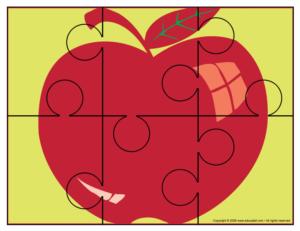 Today’s play-of-the-day is brought to you by puzzles. We tend to think of puzzles as a toy, but they are very much a great learning tool. Here are only a few of the strategies and skills that kids practice and develop when they play with puzzles:
Today’s play-of-the-day is brought to you by puzzles. We tend to think of puzzles as a toy, but they are very much a great learning tool. Here are only a few of the strategies and skills that kids practice and develop when they play with puzzles:
- noticing details: Kids learn to look at the color, size and shape of pieces.
- problem-solving: Finding where each piece fits is a mini problem. What strategies does your child use to come up with a solution?
- spatial skills: As little hands match the pieces to the spaces, brains are learning to do the same thing. The ability of children to manipulate shape and space mentally is an important predictor of later skill in this area and playing with puzzles can help build this.
- memory: Children will do a puzzle over and over and stretch their memories remembering which piece fits where, what the finished picture looks like, and more.
- muscle development. The small muscles in the hand and arm are developing and need lots of experiences making small movements.
- hand-eye coordination: Getting fingers and hands to coordinate with brain instructions can be tricky.
- attention and concentration: A puzzle is very patient and will still be there as children get distracted but at the same time, eyes and hands remind kids to return to the puzzle.
- satisfaction and confidence: Kids feel pleased when they finish a puzzle and this boosts confidence in their abilities.
Because puzzles come from very simple to very hard, we can match a puzzle to a child’s level. There are puzzles to appeal to every interest of children, from apples to zebras. Both boys and girls can do and enjoy puzzles. They can be done independently or with a friend and children can play with them over and over again. Does your child enjoy playing with puzzles?
